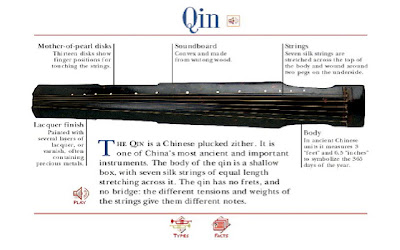The construction of guqin is really simple, which has only seven strings and a zither which is made out of wood. Guqin is usually 122-125 cm long and about 55cm wide. Although the construction is simple, the types of Guqin are various due to the long history, which generally varies by the types of wood, shapes, strings and ways to make. The Guqin consists of a long, narrow upper wooden board made from the tong tree (or other trees of the pine family) and a lower board made from the catalpa tree or other hardwood. There are 13 dots called Hui located on the upper board mark the positions of harmonics. Seven strings are stretched on the upper board from the thickest to thinnest (“Guqin-Chinese Traditional Musical Instruments”).
Though guqin has only seven strings , 100 harmonics can be played on it making the insturment has the largest number of overtone, whicn also indicates the wisdom and the creativity of ancient artists. Unlike the eighty-eitht keys of a piano which a key represents one overtone, a guqin has strings. Different position in a string can make a different sound. Theoretically, there are infinite spots in a string which makes a guqin has a lot of different overtone.
The sound of guqin is really unique. "When I play it I feel as though I'm trying to catch something that's hovering elusively in the air," Dai Xiaolian, one of the tiny number of people who still teach the instrument, told BBC World Service's The World Today programme(Changing China leaves guqin behind,BBC). For most peple, when hearing music played by guqin, can feel the inenarrable peace. In a philosophical sense, pursuring peace is exactly the main mentality that ancient Chinese had been seeking. As a result, guqin also reflects the harmony between nature and human that Chinese have been wishing for. It is also the main root of a five-thousand-year culture.
However, the sad fact is not many people play guqin today. Guqin is becoming rare in China right now and a lot of great musicals have lost and we can never hear them again. “
As a living traditionally culture artifact of China, guqin plays a significant part in representing the Chinese music, handicraft, art, wisdom of China. It collects unique sounds and musical styles. As the result, Guqin should be honored as the father of Chinese Music Instruments


No comments:
Post a Comment